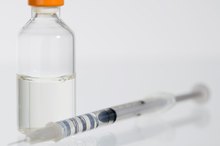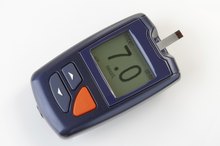D-Ribose & Blood Sugar
D-Ribose is a special sugar made in your body, but it also comes as a supplement. D-ribose's main claim to fame is that it delivers energy rapidly and helps athletes and strenuous exercisers recover from their workouts faster. D-ribose behaves in a similar fashion in diabetics and non-diabetics. However, the sugar also increases insulin releases, and it can dramatically lower blood sugar. Although D-ribose is well tolerated, you should talk to your doctor before taking it.
D-Ribose Facts
D-ribose, more often referred to as simply ribose, is a simple carbohydrate with five carbon molecules. Athletes take it in supplement form to shorten their recovery time. Ribose sparks the synthesis of a molecule called ATP, or adenosine triphosphate, which is the chemical form of the energy that goes to your cells and powers all the activities of life. Writing on the ShareCare website, Dr. Mehmet Oz states, "Of all the things you can do to combat the effects of knee-dragging fatigue, taking daily a ribose supplement is the one that seems to really turbo-charge some people who have diseases with low energy associated with them. 3"
- D-ribose, more often referred to as simply ribose, is a simple carbohydrate with five carbon molecules.
- Writing on the ShareCare website, Dr. Mehmet Oz states, "Of all the things you can do to combat the effects of knee-dragging fatigue, taking daily a ribose supplement is the one that seems to really turbo-charge some people who have diseases with low energy associated with them.
Effects on Blood Sugar
How to Use D-Ribose for Weight Loss
Learn More
Scientists have studies the effects of ribose since the late 1950s. When injected into diabetics and non-diabetics, ribose causes a swift release of insulin and a dramatic reduction in blood sugar levels. St. Cloud State University researchers publishing in "The Internet Journal of Nutrition and Wellness" in 2008 wrote that ribose's effect on blood glucose took just 45 minutes after giving 10 grams of it to a sample of 10 adults 2. Other reports witnessed this effect in fewer than 30 minutes.
To produce this effect, ribose may interact with the liver's production of glucose, as well as affect how insulin works in the liver. But the effect only lasts a little while; glucose levels return to pre-ribose state within one to two hours, making ribose an unlikely treatment recommendation for diabetics. However, ribose exerts some control over the release of oxygen free radicals, which may help lower your risk of diabetes.
- Scientists have studies the effects of ribose since the late 1950s.
- But the effect only lasts a little while; glucose levels return to pre-ribose state within one to two hours, making ribose an unlikely treatment recommendation for diabetics.
Start Slowly
If you’ve decided to try ribose, do a trial run to determine how well you tolerate it. For example, Dr. Oz advises starting with about 500 milligrams three times daily for one week. You may need to get used to its taste. After that, Oz says, start taking 5 grams three times daily for three weeks. At this stage, you'll see the full effect of ribose on your energy levels. Finally, he recommends cutting back to 5 grams daily taken just twice daily.
- If you’ve decided to try ribose, do a trial run to determine how well you tolerate it.
- Finally, he recommends cutting back to 5 grams daily taken just twice daily.
Safety
What Causes a Person to Crash After Drinking Caffeine?
Learn More
In a major review of studies on ribose, NYU's Langone Medical Center in 2011 declared that ribose is well tolerated and that no sustained or damaging effects have been reported. However, formal safety studies have not been published yet. Only minor side effects, such as diarrhea, nausea, headache and stomach upset have been reported. You should still ask your health-care provider whether he has any objections to your taking ribose. After all, the supplement is still a carbohydrate, and carbohydrates affect blood sugar.
- In a major review of studies on ribose, NYU's Langone Medical Center in 2011 declared that ribose is well tolerated and that no sustained or damaging effects have been reported.
Related Articles
References
- Diabetes: Metabolism of D-Ribose in Diabetes Mellitus
- Bioenergy: Effect of D-Ribose on Insulin and Blood Glucose: A Chronological Examination
- ShareCare: What Is Ribose?
- Bioenergy: Ribose Literature
- Smart Publications: D-Ribose is Awesome! -- Interview with Dr. Jacob Teitelbaum
- Bayram M, St Cyr JA, Abraham WT. D-ribose aids heart failure patients with preserved ejection fraction and diastolic dysfunction: a pilot study. Ther Adv Cardiovasc Dis. 2015;9(3):56-65. doi: 10.1177/1753944715572752.
- Eijnde BO, Van Leemputte M, Brouns F, et al. No Effects of Oral Ribose Supplementation on Repeated Maximal Exercise and de Novo ATP Resynthesis. J Appl Physiol. 2001;91(5):2275-81. doi: 10.1152/jappl.2001.91.5.2275
- Jones K, Probst Y. Role of dietary modification in alleviating chronic fatigue syndrome symptoms: a systematic review. Aust N Z J Public Health. 2017 Aug;41(4):338-344. doi: 10.1111/1753-6405.12670.
- Kreider RB, Melton C, Greenwood M, et al. Effects of Oral D-ribose Supplementation on Anaerobic Capacity and Selected Metabolic Markers in Healthy Males. Int J Sport Nutr Exerc Metab. 2003;13(1):76-86.
- Omran H, Illien S, MacCarter D, St Cyr J, Lüderitz B. D-Ribose Improves Diastolic Function and Quality of Life in Congestive Heart Failure Patients: A Prospective Feasibility Study. Eur J Heart Fail. 2003 Oct;5(5):615-9.
- Teitelbaum JE, Johnson C, St Cyr J. The Use of D-Ribose in Chronic Fatigue Syndrome and Fibromyalgia: A Pilot Study. J Altern Complement Med. 2006 Nov;12(9):857-62. doi: 10.1089/acm.2006.12.857
- Yancy CW, Jessup M, Bozkurt B, et al; American College of Cardiology Foundation; American Heart Association Task Force on Practice Guidelines. 2013 ACCF/AHA guideline for the management of heart failure: a report of the American College of Cardiology Foundation/American Heart Association Task Force on Practice Guidelines. J Am Coll Cardiol. 2013;62(16):e147-239. doi: 10.1016/j.jacc.2013.05.019.
Writer Bio
Angela Ogunjimi has been a prize-winning writer and editor since 1994. She was a general assignment reporter at two newspapers and a business writer at two magazines. She writes on nutrition, obesity, diabetes and weight control for a project of the National Institutes of Health. Ogunjimi holds a master's degree in sociology from George Washington University and a bachelor's in journalism from New York University.









